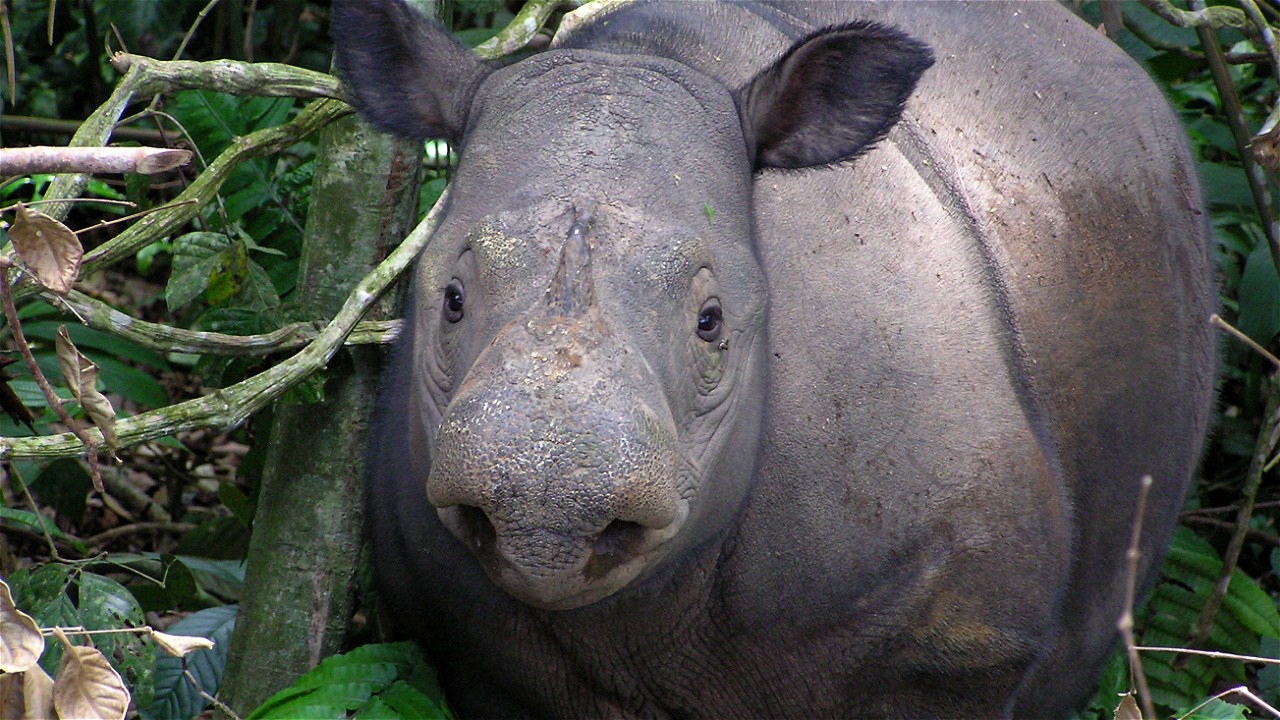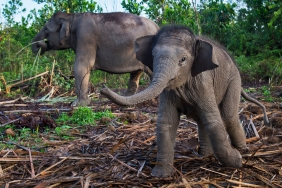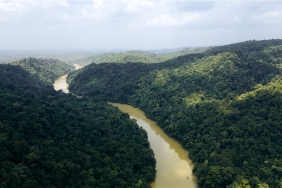LOCAL TRAINING AND KNOWLEDGE SHARING ON SUMATRAN RHINO SURVEYS
By: Hijrah Nasir
As a charismatic ancient animal that is endangered in nature, the Sumatran rhino is threatened with extinction due to various factors. Habitat fragmentation, poaching and horn trade, and are some of the things that threaten their extinction. Unfortunately, one of the problems of Sumatran rhino conservation is the uncertainty of population status in the three main landscapes of rhino habitat, namely in the Bukit Barisan Selatan National Park, Way Kambas and the Leuser Ecosystem Area.
To increase public awareness about Sumatran rhino conservation, on September 22 every year, the whole world commemorates World Rhino Day. To coincide with World Rhino Day 2017, WWF supported by Tropical Forest Conservation Action (TFCA) held a Sumatran Rhino Survey Knowledge Sharing and Training activity which took place at Way Kanan resort, Way Kambas National Park, Lampung. The activity which took place from September 18 - 23, 2017 was attended by participants from 3 main landscapes for rhino conservation in Sumatra, namely Gunung Leuser National Park, Way Kambas National Park, and Bukit Barisan Selatan National Park. The institutions that attended as participants included the Leuser Conservation Forum, Leuser Indonesia Foundation, Leuser National Park officers, Way Kambas National Park officers, Bukit Barisan Selatan National Park staff, WCS, YABI, ALeRT, and WWF Indonesia field team.
The purpose of this training is to share lessons learned from field surveys conducted by the Sumatran rhino survey team in three landscapes in Sumatra, namely the Leuser Ecosystem, Bukit Barisan Selatan and Way Kambas, and increase the capacity of the field team to carry out standardized surveys in Sumatran rhino monitoring. This is done by ensuring the understanding and ability of the survey team to recognize signs of the presence of Sumatran rhinos and can distinguish signs of the presence of Sumatran rhinos from other animals, especially tapirs.
Although several institutions have developed a Sumatran Rhino Survey and Monitoring Guidebook in 2014, the team felt the need to better apply the survey method to increase the effectiveness of the survey to produce more valid data. The meeting of field teams from several institutions in these 3 landscapes is a very important momentum to share knowledge and experience regarding Sumatran rhino surveys in their respective landscapes.
Regarding the urgency of Sumatran rhino conservation in Indonesia, in December 2016, the Ministry of Environment and Forestry appointed an expert panel team consisting of Dr. Ir. Moh. Haryono, M.Si from the Directorate of KKH, Prof. Dr. Gono Sumiadi from the LIPI Biology Research Center, Drs. Hario Tabah isono from FFI-IP, and Dr. Sunarto from WWF-Indonesia. The expert panel team provided recommendations on efforts that must be made for Sumatran rhino conservation in each landscape. This training is a follow-up to the panel team's recommendations for more accurate surveys.
Present as resource persons in this training included the panel expert team, Dr. Ir. Moh. Haryono, M.Si, Prof. Dr. Gono Sumiadi, and Dr. Sunarto. Other resource persons included the Director of the Indonesian Rhino Foundation, Widodo Ramono, LIPI's Muh. Zein, Yuyun Kurniawan, and Drh. Kurnia Oktavia from WWF-Indonesia, and Koman Liyo from BASARNAS.
This activity lasted for a week. For three days participants received material on refresher occupancy survey methods and camera trapping and occupancy practice, camera trapping and introduction to Sumatran rhino tracks, introduction to navigation & living techniques in nature, introduction to genetic surveys (DNA) and practice taking genetic samples (DNA & eDNA) in the form of fecal DNA and water DNA from rhino puddles. In addition to getting material, the team also visited the Sumatran Rhino Sanctuary TNWK to see and study Sumatran rhinos directly. Furthermore, for two days the team conducted integrated team field practice by conducting occupancy surveys, camera traps, and taking DNA samples of rhino water puddles. The field practice carried out in the Tiger Elephant Rhino Monitoring Area (TERMA) area, Way Kambas National Park is the application of material and practice from the Sumatran rhino survey conducted. After the field practice, each team presented the findings in the field and began to develop an action plan that would be carried out by each landscape based on the recommendations of the expert panel team.
"The survey team is the spearhead in Sumatran rhino conservation because they will produce data and information to determine the direction of the animal's conservation policy. The motivation and capacity of the team is the key to the success of survey activities." Said, Sunarto Ph.D as the Sumatran rhino expert panel team.
The implementation of the Sumatran Rhino Survey Local Training and Knowledge Sharing is expected to increase the capacity of the survey team and become a momentum for sharing information and learning between stakeholders for the sake of strengthening Sumatran rhino conservation efforts. and through the celebration of World Rhino Day is expected to foster awareness and enthusiasm from all parties for better Sumatran rhino conservation efforts.





